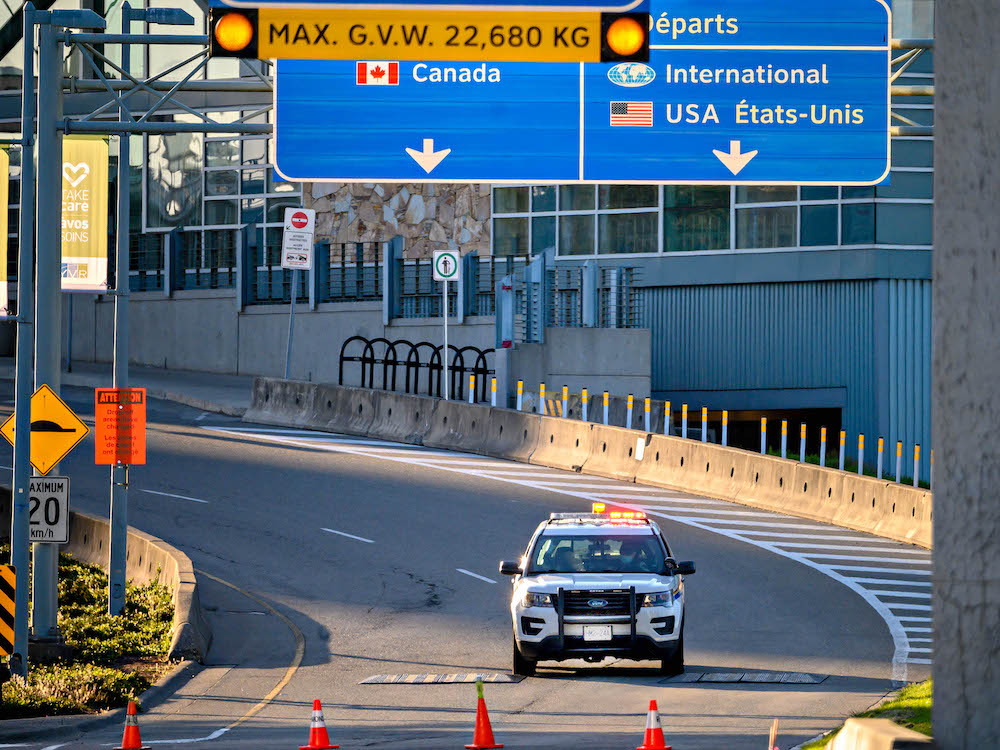The surprising aspect of the brazen daylight shooting of United Nations gang member Karman Grewal at the Vancouver International Airport departures terminal in May 2021 was not the impact on terrified innocent bystanders, the bullet holes in a police cruiser’s windshield, or that Grewal died.
What was unique about Grewal’s murder was its location at YVR, briefly closed behind police tape, a fact that triggered headlines from Hong Kong to London and shone a harsh light on B.C.’s raging Lower Mainland gang conflict.
No world-class business and tourist destination wants to be known as a place where travellers can die from a stray bullet. Grewal’s death put YVR in that category.
Police had warned the public five years earlier Grewal was on someone’s hit list. What the public did not know was that police had no strategy to avert the crime, nor did the province’s top anti-crime agency have a mandate to investigate the murder when it occurred.
Perhaps that’s why, not long after Grewal’s death, B.C.’s senior police official commissioned an external review of the province’s response to organized crime and gang murders, which had included the execution of 14-year-old Tequel Willis five months earlier and a string of 10 shootings in three weeks leading up to the Grewal murder.
The report’s damning conclusion: that B.C.’s $90-million-a-year Combined Forces Special Enforcement Unit, CFSEU-BC — the lead agency charged with confronting organized crime — was “not currently aligned with effectively preventing and responding to the escalation of key public safety threats, including emergency gang-related violence.
In fact, the CFSEU, despite having a mandate “to suppress gang violence and organized crime," does not have a mandate to investigate gang murders, the review found, relying instead on often overwhelmed local police jurisdictions.
The reviewers were unable “to identify any significant strategic interventions and violence prevention strategies” that were initiated during the period from December 2020 to March 2022 as gang killings followed one another in an endless cycle.
The existence of the report, “CFSEU-BC’s Response to Organized Crime and the Lower Mainland Gang Conflict,” was revealed in September 2023 by Vancouver Sun reporter Kim Bolan, who received a heavily redacted copy in response to a freedom of information request. This article is based on a copy I received, also much redacted, as the result of a similar FOI request.
An inadequate return on investment
The 137-page review, delivered to the solicitor general’s Policing and Security Branch in April 2023, takes care to praise the skills of CFSEU investigators and the efficiency of the agency’s funding programs. The CFSEU’s media page is crowded with news of successful investigations, including a recent massive seizure of contraband cigarettes.
But the review’s bottom line is blunt: “As it is currently constructed, CFSEU is neither effective in suppressing gang violence and organized crime, nor is it providing the province with an adequate return on investment."
That has to be good news for all the wrong people.
Since all of the report’s recommendations have been redacted, it’s impossible to say what the authors proposed, or what the government might do about the clearly unacceptable governance, funding and mandate problems crippling police counterattacks on organized crime in B.C.
The report was commissioned by Wayne Rideout, then assistant-deputy minister in the Ministry of Public Safety and the Solicitor General. Rideout, since retired, told Bolan, “I was very concerned about the escalation of violence happening in our communities caused by these gangsters. I needed assurances that there were demonstrable results.”
The reviewers — former Vancouver Police Department superintendent Mike Porteous, and criminologists Curt Griffiths and Yvon Dandurand — found that “CFSEU’s response was weak, scattered, ineffective… in stark contrast to what is expected.”
What’s needed, they say, is “an integrated, co-ordinated approach involving CFSEU and all stakeholders.”
An example is the Vancouver Police Department’s strategy, developed in 2008, that targets “the most volatile gang groups, for whatever gateway offence that could be leveraged, to start low and build up into the criminal organizations.
“A robust major case management structure, highly qualified staff, sufficient resourcing, both financial and human, were fundamental features of these types of projects. Advanced investigative techniques were utilized… that had only usually previously been utilized for homicide, and perhaps, kidnap investigations in Vancouver.”
VPD claims this approach “flattened the curve,” reducing the “incidence of shootings, violence and murder.”
A call to seriously confront organized crime
Dandurand, an expert on transnational organized crime and a fellow at Vancouver’s International Centre for Criminal Law Reform and Criminal Justice Policy, has thought long and hard about the problems facing law enforcement.
In a speech to the International Centre for Criminal Law Reform in 2020, he was clear that the problems faced in B.C. are global in nature and unprecedented in their complexity.
Law enforcement, he declared, needs “to fundamentally rethink drug market enforcement strategies and priorities in light of the growing dominance of online markets.”
Speaking before the chaos in Haiti or the gang takeover in Ecuador, Dandurand warned “that failure to seriously confront organized crime is clearly evidenced by its troubling proliferation and its penetration of every sector of social, commercial and economic activity, as well as the escalation of gang violence.
“Violence itself, including assassinations, develops into a marketable commodity. Impunity reigns. Yet, the fact is that most law enforcement strategies have thus far largely proved ineffective in combatting most forms of organized crime."
While public concern focuses, inevitably, on street violence, the most sophisticated and elite players “are usually those that are able to make strategic use of violence and systematic use of corruption and intimidation to weaken official controls and law enforcement. These criminal groups are also mobile.”
All of these threats have been identified in B.C.
No justification for inaction
In the face of the dramatic expansion of organized crime in B.C., now driving an opioid crisis among many other harms, police forces have steadily moderated their goals, Dandurand noted, stepping away from pledges to “dismantle” criminal organizations, to strategies for “weakening” them and finally hoping just for some “disrupting.”
“There obviously are some genuine obstacles to effective law enforcement action against organized crime, financial crime and money laundering,” Dandurand concluded, “but they in no way justify inaction.”
Ministry officials assured Bolan that the report’s recommendations would all be reviewed and analyzed with the RCMP and CFSEU board.
No matter why Grewal was at YVR that day, we can be sure that his death was “work-related.”
The murder, with its deadly risks to innocent bystanders and to police officers who bravely pursued the killers, underlines how each of these crimes, flowing from a multibillion-dollar criminal economy that is driving the overdose crisis, can do widespread damage to society and the economy as a whole.
Let’s hope the CFSEU review, authored by three expert British Columbians and in government’s hands for nearly a year, is having the necessary impact. ![]()
Read more: Rights + Justice, BC Politics, Media

















Tyee Commenting Guidelines
Comments that violate guidelines risk being deleted, and violations may result in a temporary or permanent user ban. Maintain the spirit of good conversation to stay in the discussion and be patient with moderators. Comments are reviewed regularly but not in real time.
Do:
Do not: